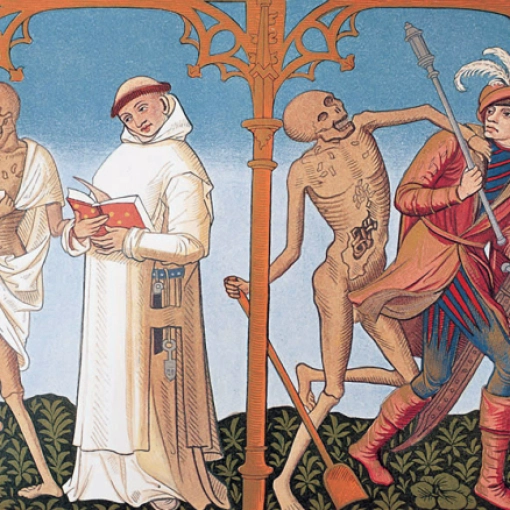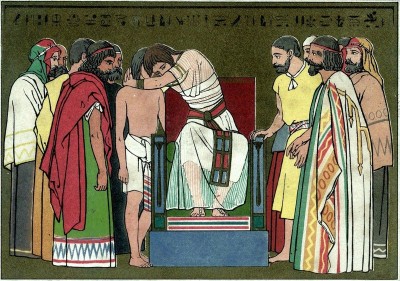Lectionary A for the Fourth Sunday after Epiphany calls for a Gospel reading from Matthew 5:1-12, aka The Beatitudes. Here’s an orientation sermon I preached on the subject years ago.
Everything about the life of Jesus has prepared you for this moment. Born to humble parents in Bethlehem, which Micah called the least of the cities of Judah. Yet Matthew changes Micah’s prophecy so that it now says, “But you, Bethlehem, in the land of Judah, are NOT the least among the rulers of Judah, For out of you shall come a Ruler Who will shepherd my people Israel.” There it is. The nature of this ruler, of this king. Weak and of no account in the eyes of men, yet full of power and great in the eyes of God.
As the king is, so is his kingdom.
He was rejected by his own at birth. By the chief priests and the scribes who did not even come to investigate when wise men from the east spoke of his birth. By Herod who hunted him in order to put him to death. From the beginning he is persecuted because of who he is, the righteous one.
As the king is, so is his kingdom.
He did not dwell in Jerusalem but in an insignificant city called Nazareth. He was called a Nazarene; that is, he was called a nobody. Nazareth, the insignificant city, was in southern Galilee. Matthew reminds us that Isaiah called it “Galilee of the Gentiles.” Why would anyone important, let alone God’s Messiah live in such a place? Jesus would grow up and remain a nobody, except to those with spiritual eyes to discern his true greatness.
As the king is, so is his kingdom.
He is poor in spirit. He mourns as one who suffers. He is meek and lowly of heart. He hungers and thirsts to establish righteousness in the earth. He is merciful, pure in heart, and seeks to make peace between God and his people; yet for that reason he is persecuted as the prophets before him and must look to heaven for his reward.
As the king is, so is his kingdom.
This is the purpose of this Sermon on the Mount. To present the ethics and the power of this new kingdom being brought in by this radically different king. Strength in weakness. Exaltation in humility. Blessedness in spite of, even because of, suffering. The people around him have never heard anything like it.
He goes up on the mountain to teach them, to proclaim to them the path to blessedness before God. Who can help thinking of another ruler of Israel who went up on a mountain to proclaim the word of God? Who can help thinking of Moses, who led the people out of Egypt, who went up on the mountain to receive the word of God and to proclaim it to the people?
Yet the two events are as different as they are similar. When Moses went up on the mountain, the people dared not follow him. They heard the voice of God giving the ten commandments from the mountain from the midst of the fire, the cloud, and the thick darkness. And they were afraid. “This great fire will consume us; if we hear the voice of the Lord our God anymore, then we shall die. For who is there of all flesh who has heard the voice of the living God speaking from the midst of the fire, as we have and lived? You go near and hear all that the Lord our God says to you, and we will hear and do it.” So Moses went up the mountain alone, to hear the word of God and to bring it back to a terrified people.
How different is the present situation! Jesus, a better mediator than Moses, goes up on the mountain … and he brings his people with him! Here he is, Emmanuel, “God with us,” about to proclaim the very word of God from the mountain. And the people are not afraid to draw close to him and hang on his every word.
Likewise, the words of blessing Jesus pronounces are vastly different from, and vastly superior to the words of blessing brought in under Moses. For what blessings did Moses pronounce but blessings upon perfect obedience? “Then it shall come to pass, because you listen to these judgments, and keep and do them, that the Lord your God will keep with you the covenant and the mercy which he swore to your fathers. And he will love you and bless you….” And surely we must concur with that judgment. The perfectly obedient OUGHT to be blessed. God would be monstrously unjust if he did otherwise. But this knowledge is of cold comfort to a sinful people. They cannot possibly offer the required obedience and so partake of the promised blessings.
This response to the Law is far from improper. Indeed, the Law was given precisely to induce this response. The Law was given, Paul says, to INCREASE transgressions. In that way the people of God would be forced to come to grips with their own unworthiness before God and to cry out for a Savior. The Law was their schoolmaster to drive them to Christ.
So those who lack perfect obedience cry out to God in anguish. They confess that they have no claim upon or right to citizenship in God’s kingdom but must depend on his grace. They mourn over their miserable condition and have no hope but that God may lift them up. They are meek; they lay no claim to dwell in God’s presence but throw themselves on the mercy of the Lord. They hunger and thirst for a righteousness they do not have and without which they cannot stand before the Lord.
And what does Jesus come to tell them? You are blessed. BLESSED!! Can you imagine it? The blessing that God through Moses offered to those who had perfect obedience … now through Jesus he offers it to those who have nothing. On one condition only: that they confess that they have nothing. They lay no claim to the kingdom, yet theirs it is! They mourn because they are cursed and their world is cursed and God comforts them! They do not think of themselves as those who may dwell in the presence of God, and God says they shall inherit the land. That means they will dwell in his presence forever! They hunger and thirst for what they do not have, for righteousness … and they are satisfied!
Suddenly, as Geerhardus Vos says, “The consciousness of having nothing, absolutely nothing, is the certain pledge of untold enrichment.”
To those who hear these words, this is good news. Good beyond hope. It is also surprising news. After all, when God pronounced his blessing on the perfectly obedient, that was perfectly understandable. As we said, God would be unjust to do otherwise. But THIS blessing. What is its basis? Where does it come from?
This blessing is a thing of pure grace. Unmerited favor. No! More than that. Favor to those who have deserved the OPPOSITE. Jesus is introducing a kingdom whose foundation is the free and total grace of the living God. The ethics of this kingdom, the “law” of this kingdom if you will, must then conform utterly to the grace of God. It is this kingdom for which the kingdom of God under Moses was preparing and in which the kingdom of God under Moses is fulfilled. The people under the Law hungered and thirsted for this kingdom of righteousness. Now Jesus is satisfying their hunger. This, he says, is what a kingdom founded on, filled with, and empowered by grace will look like.
The people of this kingdom will begin with the knowledge and the confession that they are nothing and that they have nothing. Thus shall they show themselves fit recipients of the grace of God. For who can boast in such circumstances as though he has earned anything? Will they boast, “I am better than others because I came to understand how wretched and miserable I am. That is why God blessed me”? What a ridiculous boast! Will they not rather say, “The Law of God revealed to me how wretched and miserable I am, and the grace of God saved me in spite of that” and all the glory shall go to God. To be saved by grace says nothing good about you and everything good about God. The kingdom founded on grace must have as citizens those who have been taught their own poverty and thus the magnitude of God’s favor in saying to them “Blessed are you.”
And the citizens of a kingdom founded on grace will also go on to express that grace to one another and to the whole world. They will be merciful, for they have obtained mercy. Their hearts will be purified that they may see God. They will seek to make peace, for God, their great enemy, has made peace with them.
One other difference is remarkable between the old, shadowy, provisional kingdom under Moses and the new, consummate, eternal kingdom of God in Christ.
What blessing does God pronounce on the obedient in the Law? “he will love you, bless you, and multiply you; he will bless the fruit of your womb and the fruit of your ground, your grain and your wine and your oil, the increase of your cattle and the issue of your flock, in the land that he swore to your ancestors to give you. You shall be the most blessed of peoples, with neither sterility nor barrenness among you or your livestock. The Lord will turn away from you every illness; all the dread diseases of Egypt that you experienced, he will not inflict on you, but he will lay them on all who hate you. You shall devour all the peoples that the Lord your God is giving over to you, showing them no pity.”
There are the blessings! Riches that the eye can see and the hand can handle and the tongue can taste! But now Jesus pronounces a blessing on the poor, the downtrodden, the meek, the lowly, those who are of no account, who do not appear to triumph over their enemies but are persecuted and reviled by them. In what sense are they “blessed”? Clearly not in an earthly material sense. But there reward IN HEAVEN, Jesus says, is great indeed. And that shall be revealed at the last day.
Yet Jesus does not for that reason say, “Blessed WILL be” all these people, but “Blessed ARE” they. The blessedness that is given is theirs to partake of immediately, even as they wait with eager longing for the day when their blessedness is revealed. To quote Vos again “It is blessedness that is promised here, and the word does not so much signify a state of mind, as that great realm of consummation and satisfaction, which renders man’s existence, once he has entered into it, serene and secure for evermore.” In other words, “blessed” here doesn’t mean “happy”. Don’t believe that translation! “Happy” doesn’t go nearly far enough. “Blessed” means “eternally secure”, “having everything you need.” Those who realize they have nothing have just become those who have everything and can never lose it.
The blessings of the Mosaic kingdom were visible, material, external, and lasted only until death. The blessings of the new kingdom are invisible (though clearly seen by faith), heavenly, spiritual, and eternal.
So these are the things we will be looking for and finding as we explore this Sermon on the Mount.
We will look for a kingdom founded on grace, whose people are blessed not because of their merit but because of the kindness and grace of God. Thus we will see citizens of this kingdom in chapter 7 who do not have but they ask and it is given to them; they do not possess but they seek and so they find; they do not have the power to open the gates of heaven, but they knock and the doors are opened.
We will look for a kingdom whose citizens reflect the grace of God and so are further blessed. They will not judge for they themselves have not been judged. But rather they will forgive men their trespasses for their heavenly Father has forgiven them.
And we will look for a spiritual, heavenly, eternal kingdom. Thus, the citizens of this kingdom will not lay up treasure on earth but in heaven where moth and rust do not destroy and thieves do not break in and steal. And being already supremely blessed they will not worry but will seek first the kingdom of God and his righteousness, and everything they need will be given to them.


 Today we celebrate the 500th anniversary of the Protestant Reformation. But is “celebrate” the appropriate word? Is that really the tone our commemoration should take? It seems rather like a woman celebrating the 10th anniversary of her divorce. One understands the reason for the celebration, but it still seems somehow distasteful–rejoicing in the dissolution of what God had joined together. It’s distasteful even if the woman had solid Biblical grounds for her divorce, just as we had solid Biblical grounds for separating from the Roman church. It’s distasteful even if the woman’s husband was despotic, abusive, and corrupt. The Roman church was all those things. You’ll never hear me claim otherwise. But I can’t rejoice in the memory of the awful day when those troubles began coming to a head.
Today we celebrate the 500th anniversary of the Protestant Reformation. But is “celebrate” the appropriate word? Is that really the tone our commemoration should take? It seems rather like a woman celebrating the 10th anniversary of her divorce. One understands the reason for the celebration, but it still seems somehow distasteful–rejoicing in the dissolution of what God had joined together. It’s distasteful even if the woman had solid Biblical grounds for her divorce, just as we had solid Biblical grounds for separating from the Roman church. It’s distasteful even if the woman’s husband was despotic, abusive, and corrupt. The Roman church was all those things. You’ll never hear me claim otherwise. But I can’t rejoice in the memory of the awful day when those troubles began coming to a head.